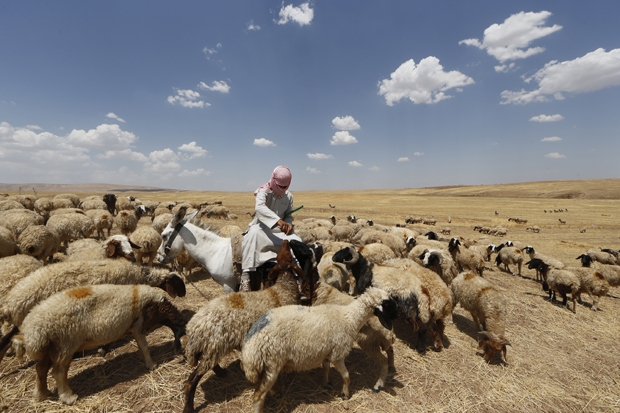Erbil, Iraq

The Kurds here are fighting Isis — everyone knows that. Most of us are at least peripherally aware that the brave Peshmerga (Kurdish militia) have proved an effective force against the Islamists, and we cheer them on. What we don’t realise is that as they battle the world’s latest bogeyman, the Kurds are also simultaneously suffering from another sort of crisis.
Traditionally the Iraqi Kurds are nomadic pastoralists. They’ve herded sheep since biblical times, leading their flocks from the mountains to the lowlands and back. The passion they feel for their land is rooted in this pastoral tradition. It’s a weird irony, then, that as their dream of a separate state grows close to being realised, their way of life is dying.
Outside Erbil, you can see the two natures of Kurdistan, traditional and modern, existing side by side. My guide, Reb, and I watch as a herder in a black leather jacket leads his sheep behind two camouflaged men with guns resting on sandbags. The land is dotted with refineries, and every so often spires of flame tower up into the sky, silhouetting the soldiers against the distant city, with its skeletal half-constructed concrete buildings surrounded by crowds of cranes.
It was Saddam who began altering the age-old Kurdish identity. He and his cousin, Chemical Ali, conducted a brutal campaign, — codenamed Al-Anfal — gassing civilians and razing Kurdish settlements. Reb and I pass many shattered villages, still just piles of rubble.
The land, once full of animals grazing, was badly damaged by Saddam. During the 1980-88 Iran-Iraq war he destroyed the trees so the Peshmerga couldn’t hide from the Iraqi army. Now there are only small, newly planted pine trees on the mountains. ‘Hussein also put mines along the Iran-Iraq border; another obstacle for herders,’ Reb says. And the land remained poisoned from the chemicals for many years.
Following the 1991 Gulf War, Kurds were forced to return to the city to look for work; this was another blow to the countryside. Quickly many decided they were better off here. ‘There have been various KRG [Kurdistan Regional Government] efforts to encourage people to return, trying to stimulate agriculture and pastoralism,’ Reb says.
Nothing has worked, and of course it’s the cities now where Kurds want to live. There are Isis car bombs in Erbil, but also kitchen showrooms and shopping centres. In a sea of new-builds, one historic building stands — the 8,000-year-old, Unescorestored citadel. A nearby mosque has photos on the wall of a bygone Erbil, with sheep wandering the streets. Erbil attracts international business, too. Frequent signs point to volatile nearby cities such as Baghdad and Mosul, yet Iraqi Kurdistan has become a haven for western business. ‘It’s safer here than Croydon!’ says Daniel, once a British paramedic, now a medic for a gas company here.
Reb shows me fairgrounds with giant Mickey Mouse figures and ferris wheels. One, Freedom Park, is incongruously next to the Red security building, which was once one of Saddam’s secret prisons and is still full of torture equipment.
After the fall of Saddam came the oil — a mixed blessing for Kurds. It’s made the region rich, but meant another blow to the old way of life. ‘We are always portrayed as nomads, but this perception is out of date,’ says Karwan, the owner of Kurdistan Adventures, a local tour operator, as we walk around the city of Sulaymaniyah. ‘Instead we are deemed to be the next Dubai,’ he continues, pointing at the gigantic rocket shape of the Grand Millennium Sulaimani Hotel.
It’s Isis now that poses the greatest threat to the Kurds’ old lifestyle and their new one. Its forces overran expanses of northern Iraq last summer, capturing the country’s second-largest city, Mosul, and trying for a take-over of Erbil. ‘When Isis came the Iraqi army ran away,’ Reb says. ‘Shame on them as they have lots of weapons, but our Peshmerga aren’t afraid of death! They stood firm.’
One shepherd, in traditional baggy trousers, has a more circumspect view. Many Kurdish boys are now too busy to be herders, he laments. ‘They’re Peshmerga protecting our borders from Isis. But will they ever go back?’
Another herder says that since Isis the price of sheep has plummeted. ‘The whole economy has been affected,’ he says. ‘We finally had peace and now this. But that is the life,’ he adds (a common phrase here).
On one of my final days in Iraqi Kurdistan I stand at the ruins of one of Saddam’s many castles, looking down at the awful sight of Kurdish Yazidis (among the world’s oldest and smallest religious minorities) fleeing Isis. In the refugee camp later, I hear countless tales from Yazidis who had to leave all their animals and possessions behind. Tens of thousands have been displaced.
And it’s not just Yazidis. Separate refugee camps exist for Syrians, and many people are squashed into unfinished concrete buildings. Sunni Arabs also run here from Baghdad. ‘They killed us, but we offer them a flower in exchange,’ Reb says. ‘It’s ironic because it was the Arabs who previously controlled us but now many of them come and herd our sheep, doing our menial work.’
In one refugee camp, Khanke, I meet a Yazidi lady still dressed in black from mourning. She and her children are crowded around a clay stove baking flatbread, which they insist I share with them. She has arrived recently from the Sinjar mountains, she says, where she was trapped with no food for over two weeks, with three of her tiny children. ‘My aunt and cousins were kidnapped by Isis. We still do not know where they are. And they beheaded my father, filming it for YouTube.’
I came here to see if an ancient Kurdish way of life, once the heart of the nation, could possibly survive in the face of persecution, oil, and now war. The answer, I think, is no. Peace is the only objective now, and pastoralism looks like it’s had its day. Reb is excited: ‘Isis and the oil mean that for the first time we can dream of our own state,’ he says. ‘Our flag is full of blood. I want to see it in the UN.’
And after that? Yes, there’s every chance the Kurds will have a state in some post-Isis settlement, but they’ll have to redefine and re-find the soul of that state.






Comments